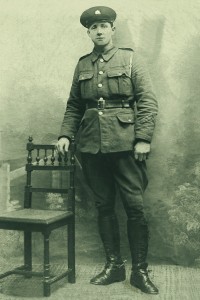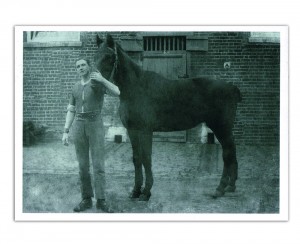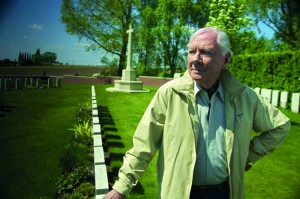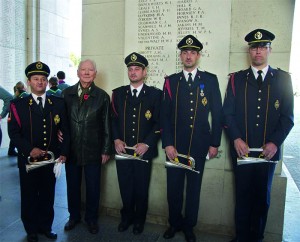SEEN ON TV
Published in Issue 4 (July/August 2014), Reviews, Volume 22
Gay Byrne’s father, Edward, in uniform.
My father’s war
RTÉ 1, April 2015
For the centenary years of the First World War (2014–18) the BBC are deploying their vast resources across TV, radio and on-line platforms in what is, apparently, the single largest project they have ever undertaken: dramas, documentaries, debates, real-time accounts and much more besides are scheduled for production and broadcast. Unlike in the Republic of Ireland, the Great War has been an integral part of British culture for decades. This may be one of the reasons why debate on the war in Ireland can seem almost parochial; an understandable emphasis on the manner in which the memory of Ireland’s role in the war was neglected in recent decades has tended to obscure consideration of what the Irish participation in the war actually comprised. But RTÉ’s first contribution to the centenary of the ‘Great War’ tackled this issue head-on. My father’s war was based on a simple premise—an exploration of the wartime experience of Edward Byrne, Gay Byrne’s father.
There are over 200,000 similar stories that could be told; often, however, they were not. It is certainly the case that the major commemorations of Armistice Day that took place in Ireland in the 1920s and 1930s faded away after World War II, in a state that had an ambiguous attitude towards the Irish involvement in the war: in the wake of a struggle for independence from Britain that British armed forces had tried to suppress it was always going to be difficult to fully acknowledge Irishmen who had earlier fought in the same armed forces. The Cumann na nGaedhal and Fianna Fáil governments of the 1920s and 1930s were by no means oblivious to the human cost of the war (witness the construction of the massive Islandbridge memorial), but they were acutely conscious of the political implications of commemorating it. Major commemorations took place without the involvement of the state. It has become a truism—or even a cliché—to imply that a conspiracy of silence and intimidation cast a veil over the remembrance of the Irish dead of the First World War. Yet this was an issue that would, by its nature, impinge upon the survivors rather than the casualties, and many of the Irish survivors had other problems with which they were forced to grapple. Gay Byrne and his father discussed the latter’s wartime experience only once, but the Byrne family had ongoing nocturnal reminders of it, as Edward Byrne often woke screaming in the middle of the night in the family home in Rialto, haunted by an experience that he never revealed to his children.

Edward Byrne was a coachman who joined the 19th Hussars, a cavalry unit.
Edward Byrne was a coachman who joined the 19th Hussars, a cavalry unit. The skeletal details of his service record revealed his presence at Ypres and the Somme, amongst others. Byrne’s ‘little turns’ were a symptom of a wartime experience that he may never have fully discussed with anybody. Yet his trauma may well have been the result of actions as much as experience: Irish soldiers went to war to kill, and did so. In what was the most powerful moment of an impressively measured documentary, the elderly Gay Byrne became visibly affected by an exploration of the hand-to-hand combat in which his father almost certainly participated during an incident in which German troops overran British trenches; Edward Byrne would have been forced to kill lest he be killed himself. The point was all the more powerful as it was put to Byrne in the Belgian graveyard containing the bodies of men who had died in the same engagement. Edward Byrne surely knew some of these men; for his son, the fact that he had not been laid to rest amongst them was a testament to his luck. And he was lucky: cavalry quickly became obsolete amidst the mechanised warfare of 1914–18, and Edward Byrne returned home. After the war he benefited from the favour that Guinness showed to ex-servicemen; he was employed in the brewery for the rest of his working life but left no account of his experiences, nor any explanation of what haunted him at night.

Gay Byrne at Lone Tree Cemetery in West-Flanders—mostly containing the graves of soldiers of the Royal Irish Rifles killed on the first day of the Battle of Messines in June 1917
My father’s war was an engaging variation on the familiar style pioneered by Who do you think you are? The approach taken was that of a ‘life and times’; in the absence of direct testimony from Edward Byrne, or substantial recollections from his children, the documentary explored the world of which he would have been a part. My father’s war was arguably less about Gay Byrne’s father than about the broader Irish experience of the war itself (as explored in nuanced fashion by John Horne, Fearghal McGarry and others). It is to the credit of the producers that it did not shy away from the horrors of the war. There was little room for sentiment or nostalgia here.

he Menin Gate Memorial with members of Ypres Fire Brigade, who sound the Last Post there every evening at 8pm in memory of British Commonwealth soldiers who died in the war.
Edward Byrne was not alone. Perhaps a quarter of all Irish veterans of the First World War were traumatised by their experience, and internalised this in a world where counselling was unknown. The same would surely have been true of their British comrades in arms. They, however, resided in a country in which the war played a far greater role in official public life; there was a culture that could offer some recognition of their experience. But in a state that was not inclined to dwell upon the Great War, did some survivors such as Edward Byrne draw a veil over their experiences? Alongside indifference and hostility, did trauma create a silence of its own? The centrality of the war in British culture has perhaps enabled the British to ask the question of whether or not it was worth fighting (witness the right-wing historians Max Hastings and Niall Ferguson arguing the toss in their respective BBC documentaries earlier this year). The renewed emphasis on the Irish stake in the Great War might force such questions to be addressed from an Irish perspective over the course of the centenary. Eulogies for the lost world of John Redmond, or wistful comments about how Catholics and Protestants fought together, should not obscure the reality that the Irish stake in the First World War came with a horrific human cost. As Gay Byrne readily recognised in this excellent documentary, his father was indeed luckier than many.
John Gibney is editor of www.decadeofcentenaries.com
















